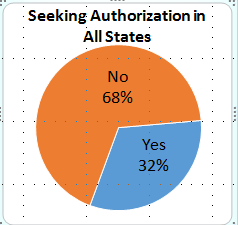What are Institutions Doing (or Not Doing) About State Authorization: 2014 Survey
Published by: WCET | 5/16/2014
Tags: Distance Education, Reciprocity, Regulation, Research, SARA, State Authorization, U.S. Department Of Education
Published by: WCET | 5/16/2014
Tags: Distance Education, Reciprocity, Regulation, Research, SARA, State Authorization, U.S. Department Of Education
Colleges increasingly comply with state authorization regulations for distance education, but they often do so by choosing not to enroll students from some states. These are some of the findings of the latest survey on institutional progress in state authorization.
We are often asked “what are others doing about state authorization?” This survey was created to find the answer to that question and to gauge progress over time.
WCET partnered with UPCEA (University Professional and Continuing Education Association) and M-SARA (Midwestern State Authorization Reciprocity Agreement) in the third administration of the “What are Institutions Doing (or Not Doing) About State Authorization” survey. The previous surveys were conducted in 2011 and 2013.

Thank you to Jenny Parks (M-SARA) and Tanya Spilovoy (North Dakota University System) for advising on the wording of the survey questions. Thank you to Jim Fong from UPCEA for his masterful data handling skills in conducting the survey. They have been fabulous partners.
Russell Poulin
Interim Co-Executive Director
WCET – WICHE Cooperative for Educational Technologies
rpoulin@wiche.edu
If you like our work, join WCET!
3 replies on “What are Institutions Doing (or Not Doing) About State Authorization: 2014 Survey”
A great project ! Do you have any idea if other states are likely to send a “Maryland Letter” on the question of compliance? With so many colleges apparently not following state law, I would think that more states would try to round up the horses.
[…] seen in our survey of institutions regarding their progress on obtaining authorizations, only 25% of responding institutions possess all the approvals that they need. Since that survey, […]
[…] may also remember me from WCET Frontiers Blog blog posts (What are Institutions Doing (or Not Doing) About State Authorization: 2014 Survey, OER Supported by North Dakota Legislators, North Dakota Open Educational Resources Initiative: A […]